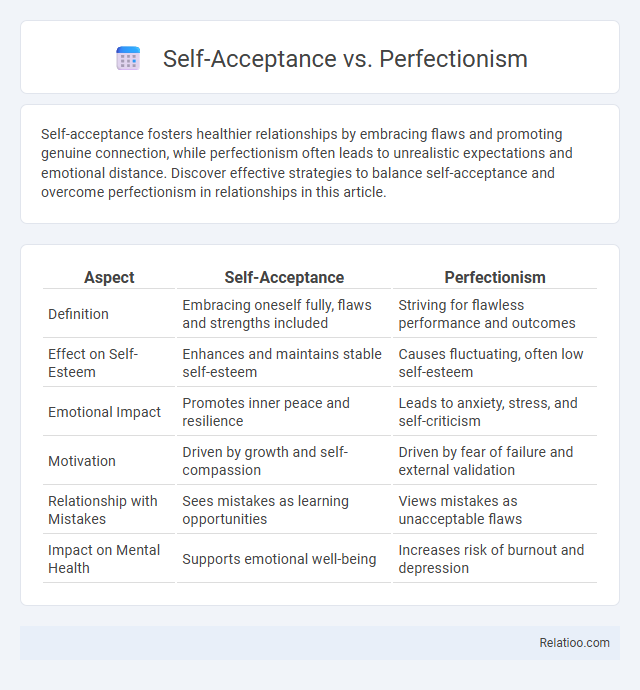Self-acceptance fosters healthier relationships by embracing flaws and promoting genuine connection, while perfectionism often leads to unrealistic expectations and emotional distance. Discover effective strategies to balance self-acceptance and overcome perfectionism in relationships in this article.
Table of Comparison
| Aspect | Self-Acceptance | Perfectionism |
|---|---|---|
| Definition | Embracing oneself fully, flaws and strengths included | Striving for flawless performance and outcomes |
| Effect on Self-Esteem | Enhances and maintains stable self-esteem | Causes fluctuating, often low self-esteem |
| Emotional Impact | Promotes inner peace and resilience | Leads to anxiety, stress, and self-criticism |
| Motivation | Driven by growth and self-compassion | Driven by fear of failure and external validation |
| Relationship with Mistakes | Sees mistakes as learning opportunities | Views mistakes as unacceptable flaws |
| Impact on Mental Health | Supports emotional well-being | Increases risk of burnout and depression |
Understanding Self-Acceptance
Understanding self-acceptance involves embracing one's strengths and weaknesses without the constant pressure to achieve flawlessness, which contrasts sharply with perfectionism's relentless pursuit of unattainable standards. While perfectionism often leads to stress and dissatisfaction, self-acceptance fosters mental well-being and realistic self-appraisal. Cultivating self-acceptance empowers individuals to acknowledge imperfections and promotes growth without the fear of failure.
Defining Perfectionism
Perfectionism is characterized by an obsessive striving for flawlessness and setting excessively high standards, which often leads to self-criticism and fear of failure. Unlike self-acceptance, which embraces personal flaws and promotes emotional well-being, perfectionism can result in chronic stress and decreased mental health. Understanding the cognitive and behavioral patterns of perfectionism helps differentiate it from healthy motivations and supports developing balanced self-awareness.
The Psychological Roots of Perfectionism
The psychological roots of perfectionism often stem from early childhood experiences, including parental expectations and societal pressures that shape an individual's self-worth and fear of failure. Self-acceptance contrasts sharply with perfectionism by fostering a realistic and compassionate view of oneself, reducing anxiety and self-criticism associated with unattainable standards. Understanding these underlying psychological factors is crucial in addressing perfectionism and promoting healthier mental well-being through acceptance and balanced personal goals.
Signs You Struggle with Perfectionism
Struggling with perfectionism often manifests through an intense fear of failure, procrastination, and harsh self-criticism that undermines your confidence. You might find it difficult to complete tasks because nothing feels "good enough," leading to chronic dissatisfaction and burnout. Recognizing these signs is crucial for developing self-acceptance and breaking free from the paralyzing grip of perfectionism.
Self-Acceptance: Key Traits and Benefits
Self-acceptance involves recognizing and embracing your intrinsic worth without relying on external validation or flawless achievements. Key traits include empathy towards oneself, resilience against criticism, and realistic self-awareness that fosters mental well-being. Embracing self-acceptance ultimately leads to reduced anxiety, increased happiness, and a healthier approach to personal growth compared to the often unattainable standards set by perfectionism.
Perfectionism’s Impact on Mental Health
Perfectionism often leads to unrealistic standards that negatively affect mental health, causing increased stress, anxiety, and depression. Embracing self-acceptance helps counteract these effects by fostering a healthier mindset and reducing the constant pressure to be flawless. Your mental well-being improves when you shift focus from perfectionism to valuing progress and self-compassion.
Overcoming the Fear of Imperfection
Overcoming the fear of imperfection requires embracing self-acceptance as a foundation, recognizing that your worth is not determined by flawless performance but by inherent value. Perfectionism often triggers anxiety and self-doubt, while self-acceptance fosters resilience and mental well-being by allowing you to acknowledge mistakes as part of growth. Prioritizing self-compassion helps dismantle the unrealistic standards imposed by perfectionism, empowering you to pursue progress rather than unattainable perfection.
Cultivating Self-Compassion
Cultivating self-compassion counteracts the detrimental effects of perfectionism by fostering acceptance of personal flaws and limitations. This practice encourages a balanced perspective, reducing self-criticism and promoting emotional resilience. Embracing self-compassion enhances mental well-being, empowering individuals to prioritize growth over unattainable standards.
Practical Steps Toward Self-Acceptance
Embracing self-acceptance involves recognizing and valuing your intrinsic worth beyond flawless performance or outcomes, which counters the often unrealistic standards set by perfectionism. Practical steps toward self-acceptance include practicing mindful self-compassion, setting realistic goals that prioritize growth over flawlessness, and actively challenging negative self-talk that fuels perfectionistic tendencies. Building a daily habit of acknowledging small achievements and learning from mistakes fosters resilience and diminishes the paralyzing effects of striving for unattainable perfection.
Choosing Growth Over Perfection
Choosing growth over perfection entails embracing self-acceptance by valuing progress rather than flawlessness. Perfectionism often leads to stagnation through fear of failure, while prioritizing growth fosters resilience and continuous improvement. Cultivating a mindset that balances high standards with self-compassion enables sustainable personal development and mental well-being.

Infographic: Self-acceptance vs Perfectionism
 relatioo.com
relatioo.com